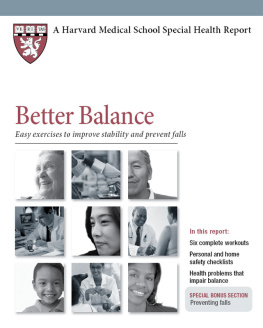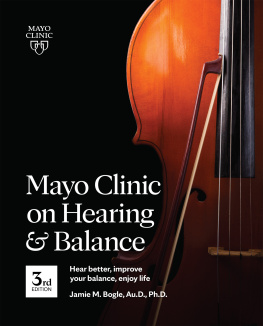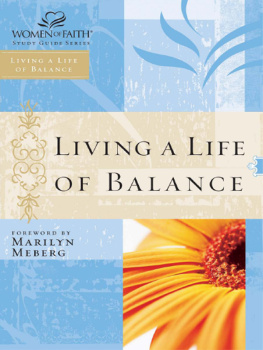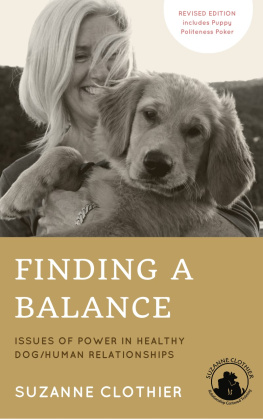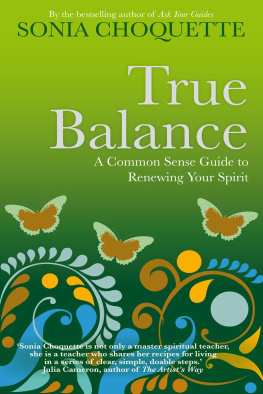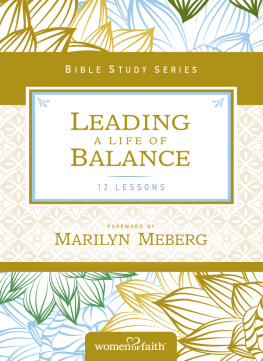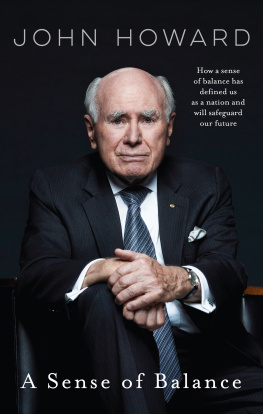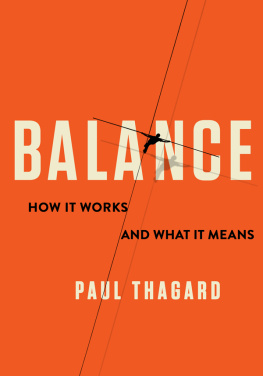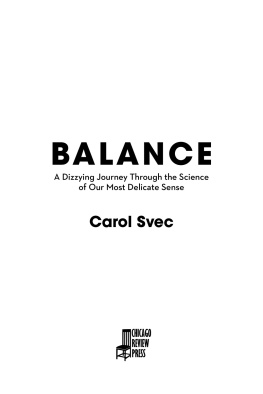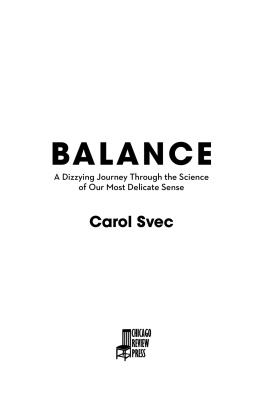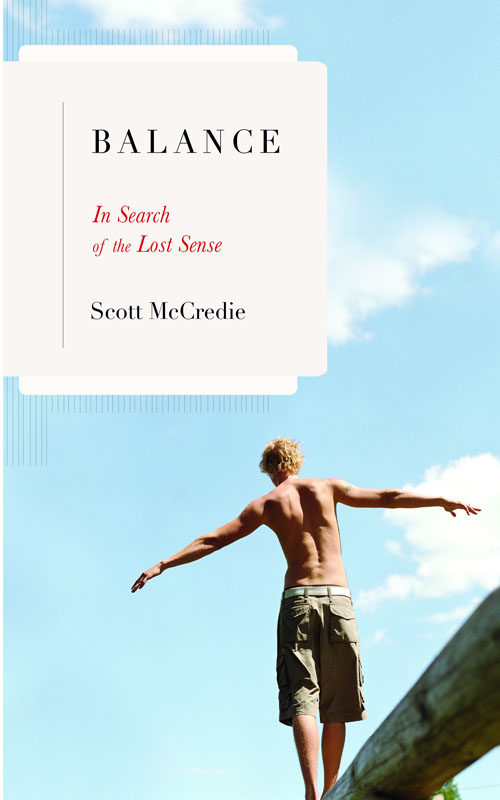Copyright 2007 by Scott McCredie
All rights reserved. Except as permitted under the U.S. Copyright Act of 1976, no part of this publication may be reproduced, distributed, or transmitted in any form or by any means, or stored in a database or retrieval system, without the prior written permission of the publisher.
Little, Brown and Company
Hachette Book Group
237 Park Avenue, New York, NY 10017
Visit our website at www.HachetteBookGroup.com
First eBook Edition: June 2009
ISBN: 978-0-316-07658-6
To my wife, Cher Maillot, who gives my life a better balance, and my parents, Grae and Bill McCredie, who caught me when I fell
Aristotle was wrong. Often credited as the first to catalog the human bodys primary senses, he neglected to mention one of our most important: the sense of balance, that intricate orchestration of nerve impulses that allows us to dance with gravity. His oversight, however, is understandable. While its easy to detect the role of the eyes, nose, skin, tongue, and ears, the receptors of balance are hidden from view and dont easily give up their secrets. Because the equilibrium sense is mostly autonomic, working below the level of consciousness, like breathing or the beating of a heart, the great philosopher apparently was unable to sense its subtle operation.
Nearly two thousand years later, the American writer Diane Ackerman made a similar error. In her popular book A Natural History of the Senses, she glossed over the balance and equilibrium faculties in just a few sentences. Ackermans short shrift of balance is less defensible than Aristotles, but it still reflects the common view. For a number of reasons, many people today arent aware that balance is a legitimate sense. Not only is there disagreement among medical professionals about what constitutes a sense, but balance is a devilishly complicated phenomenon, and to this day it remains half-veiled in mystery and ambiguity.
But among those who have studied the balance sense in depthspecialists in scientific research, physical therapy, and clinical medicinemany would argue that without it we might not have much use for the other senses. Not only is the primary balance organ, called the vestibular apparatus, older than most of the other sense organs on an evolutionary scalean indication of its importance to the survival of our primordial ancestorsbut balance is as vital to our existence today as it ever was. Without balance, many of the things we take for granted would be impossible. We could not stand on two legs, never mind walk or run. We couldnt see images in sharp detail as we move, or navigate without visual landmarks, or perhaps even think clearly.
One reason balance is the lost sense is that it was missing in action for so long, hidden in shadows as humans toiled to figure out how their bodies worked. Only in the past 150 years or so have we been able to discover just exactly what it is, how it operates, what can go wrong with it, and how to maintain and improve it. Because it is such a latecomer to the table already occupied by the other senses, balance has had to elbow its way to any sort of recognition. Now its beginning to get some well-deserved notice. And the timing couldnt be better. Balance is becoming a bigger issue now than at any time in history, mainly because people are losing it more frequently than ever before. And when you lose your balance, even for a moment, whether from disease, the effects of aging, or anything else that interrupts your dance with gravity, bad things can happen.
A few years ago my father and I were hiking together on a popular trail that leads to the top of Mount Si, on the western edge of the Cascade Mountains near Seattle. After stopping at the summit to eat lunch and catch our breath, my dad, who was sixty-seven at the time, grabbed his blue daypack, draped it casually over one shoulder, and began exploring. After a few minutes, he stopped on top of a large rock, and I idly watched him slide the pack strap slowly off his right arm. In what seemed like slow motion, his whole body then proceeded to lean awkwardly toward that side and, to my astonishment, he spun into a headfirst dive, disappearing from sight. Horror-struck, with my heart pounding, I scrambled quickly down to where I imagined him lying, in a crumpled heap, bleeding and badly injured. But by the time I reached him a few seconds later he was already beginning to sit up. Some miracle had caused him to land harmlessly on a patch of ground between boulders. Only his pride had been hurt.
As we descended back down the trail, I began thinking about my fathers fall. It was an unsettling demonstration of his growing frailty, and of the dimming of his once dynamic sense of balance. For as long as I had known him hed been an athletic and graceful man, a renowned fast-pitch softball player, and a professional woodsman who had spent years wading streams and tramping across the slippery backs of fallen logs. I then recalled a friend telling me about a fall his own mother, who was seventy-five, had recently taken. She was a vigorous exerciser who for years had walked several miles at a rapid clip three or four times a week. But on one occasion she suddenly lost her balance and fell forward onto the sidewalk, unable even to get her arms up to protect her face. My friend, though walking at her side, couldnt prevent her fall. The results were gory but not serious.
These two incidents made a deep impression on me and started me wondering about the nature of balance. What controls it? Is the decline of the human balance systemand fallingan inevitable part of growing old? Why isnt balance as commonly talked about in fitness circles as strength training or aerobics or stretching? I was bemused at first by the lack of information. But the further I looked into the subject, the more intrigued I became, not least because I had to search so far and wide to come up with answers to my questions.
One thing I learned is that balance, like all the other senses, begins to degrade after you reach your thirtiesunless the process is forestalled by techniques Ill talk about later. Balance disorders are one of the most common forms of disability in the United States. Although reliable epidemiological data are scarce, a 1989 National Institutes of Health report estimated that some 90 million people over age seventeen have experienced dizziness or balance problems. Dr. Owen Black, one of the leading clinicians in the field of vestibular disorders, reports that 70 percent of falls are mediated by an impairment of the vestibular system. While most falls dont result in serious injury, they are like a game of Russian roulette. Sooner or later the bulletin the form of fractures, lacerations, and sometimes deathwill sit in the firing chamber. While losing your sense of balance, or any sense, is a predictable part of aging, a number of other diseases and disorders also contribute to the danger, such as ear infections, certain types of brain injuries, diabetes, and the dislodging of tiny stones that reside within the inner ear (yes, every one of us has rocks in our head). Tragically, another source of severe balance loss can afflict otherwise healthy people when they contract a bacterial infection that requires a hospital stay.
Cheryl Schiltz was a vibrant, energetic, thirty-nine-year-old woman living in a small town near Madison, Wisconsin, when she suddenly lost her balance. In 1997, after undergoing routine surgery, she developed a postoperative infection that required the prolonged use of a common antibiotic called gentamicin. Seventeen days later, the drug had succeeded in killing the bacteria. But unbeknownst to her or her doctor, it had also destroyed much of the function of her vestibular system, the pair of tiny bizarre-looking organs nestled within her inner ears. These are the bodys dedicated gravity- and motion-sensing organs, similar in function to the gyroscopic guidance systems on a modern airplane. Cheryls world was soon to be turnedliterallyupside down.


